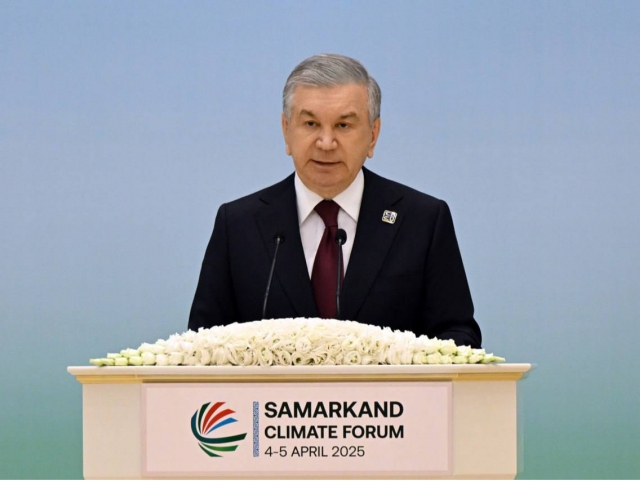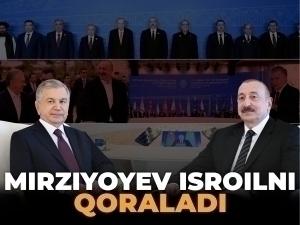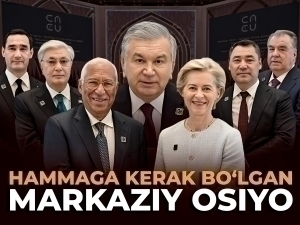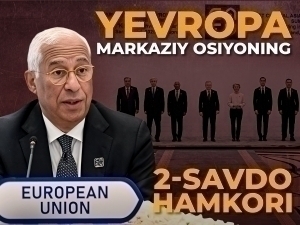Mirziyoyev: Central Asia to face severe water shortage by 2040
Local
−
04 April 2025 20561 5 minutes
On April 4, the "Samarkand International Climate Forum" convened with the participation of high-level delegations from Europe and Central Asia. The forum was attended by President of the European Council António Costa, President of the European Commission Ursula von der Leyen, President of Kazakhstan Kassym-Jomart Tokayev, President of Kyrgyzstan Sadyr Japarov, President of Tajikistan Emomali Rahmon, President of Turkmenistan Serdar Berdimuhamedov, President of the European Bank for Reconstruction and Development Odile Renaud-Basso, Executive Secretary of the UN Economic Commission for Europe Tatyana Molchan, Executive Director of the UN-Habitat Programme Anaclaudia Rossbach, Executive Secretary of the UN Convention to Combat Desertification Ibrahim Thiaw, among others.
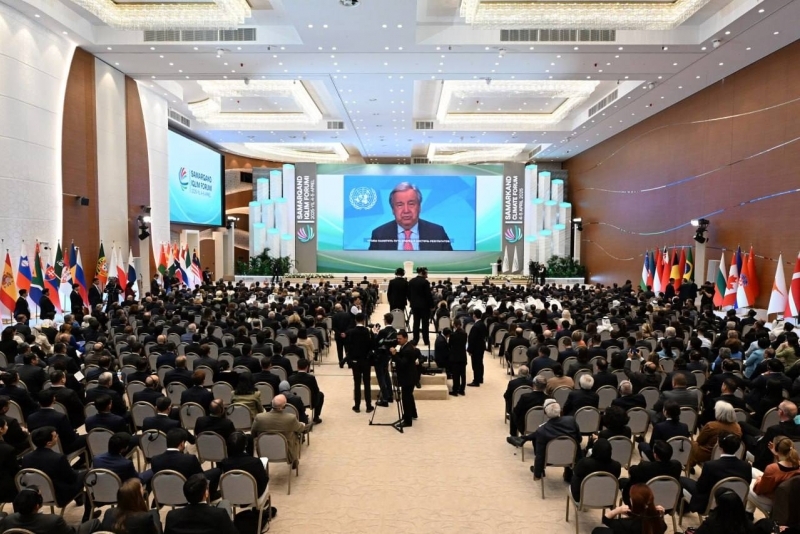
UN Secretary-General António Guterres also addressed participants via a video message. The event brought together over 2,000 foreign guests, including heads of national and international environmental organizations, experts, scientists, journalists, and business leaders.
The forum's agenda focused on urgent climate challenges facing Central Asia, including environmental sustainability, “green” economic development, and regional cooperation to combat climate change.
In his keynote address at the plenary session, President of Uzbekistan Shavkat Mirziyoyev highlighted that the international scale of the forum and the high-profile participation reflect the global community’s strong commitment to finding joint solutions to today’s most pressing sustainability challenges.
He emphasized that last year, for the first time, the global average temperature exceeded 1.5°C, making it the hottest decade in recorded meteorological history.
“As a result, we are all witnessing the negative effects of the climate crisis—raging forest fires, accelerating desertification, shrinking glaciers, growing water scarcity, and deteriorating air quality,” said the President.
He noted that the countries of Central Asia have jointly developed and adopted a strategy to adapt to climate change in the region. Ongoing cooperation with European partners has been instrumental in mitigating the consequences of the Aral Sea's desiccation, promoting rational water use, and expanding clean energy initiatives.
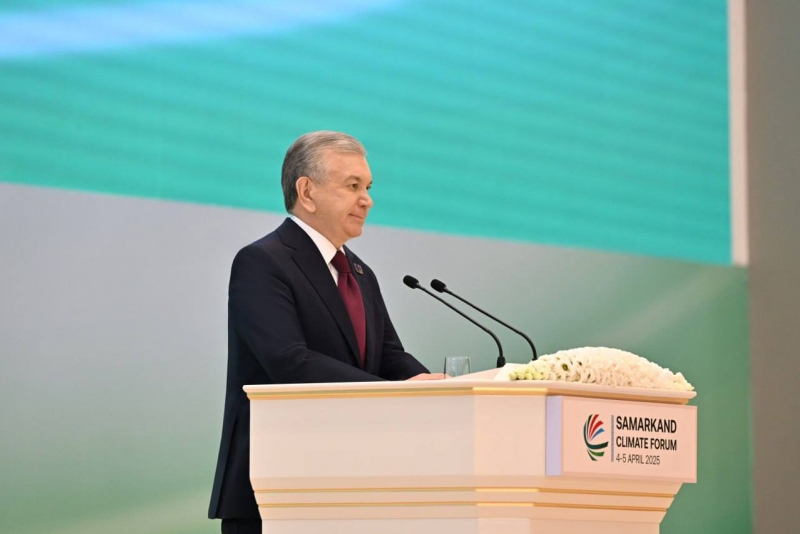
Mirziyoyev expressed strong interest in further deepening practical cooperation with the European Union, a global leader in advancing climate action. He underlined that climate challenges are deeply interlinked with food and energy security.
He stressed the urgent need to enhance the resilience of the agricultural and forestry sectors, pointing out that over 20% of the region's land is degraded and that productivity could fall by one-third within the next 25 years.
“In this regard, it is crucial to unite our scientific potential under the Horizon Europe program to ensure regional food security,” the President proposed.
Mirziyoyev also outlined Uzbekistan’s national measures to combat climate change and land degradation. The "Green Space" program has launched widespread afforestation efforts, with over 2 million hectares of Aral Sea desert areas now covered in drought-resistant vegetation.
He proposed holding an annual regional tree-planting campaign—“Green Belt of Central Asia”—in the lead-up to the Nowruz holiday.
The President also stressed the transition toward a resource-efficient and environmentally friendly economy, with a major focus on renewable energy. Uzbekistan aims to increase the share of renewables to 54% within the next five years, which would reduce greenhouse gas emissions by approximately 16 million tons.
“I would like to emphasize that Uzbekistan will do its utmost to fulfill its commitment to reduce greenhouse gas emissions by 35% ahead of schedule under the Paris Agreement,” he stated.
As part of broader regional efforts, he proposed establishing the Secretariat of the EU’s “Water–Energy–Climate Change” initiative in Tashkent to mobilize financial resources, technologies, and institutional support.
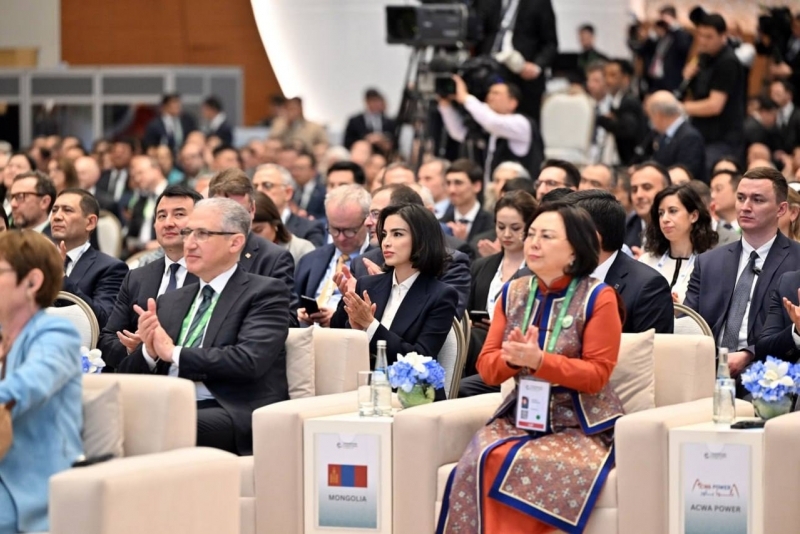
The President also drew attention to the looming water crisis, noting that due to the declining flows of the Amu Darya and Syr Darya rivers, Central Asia will face severe water shortages by 2040.
To address this, Uzbekistan has undertaken efforts to modernize irrigation networks and build an industrial base for water-saving technologies, which are now used on nearly 2 million hectares—half of all irrigated land in the country. These measures saved nearly 8 billion cubic meters of water in 2023 alone.
“We call for the consolidation of efforts to implement water-saving technologies across Central Asia and the launch of a regional program to support this,” Mirziyoyev said.
He proposed organizing an international forum on water-saving technologies in the Aral Sea region to explore these issues in depth.
The President also expressed interest in working closely with the EU through the "Copernicus" program to conduct satellite monitoring of glaciers and improve early detection of threats to mountain ecosystems.
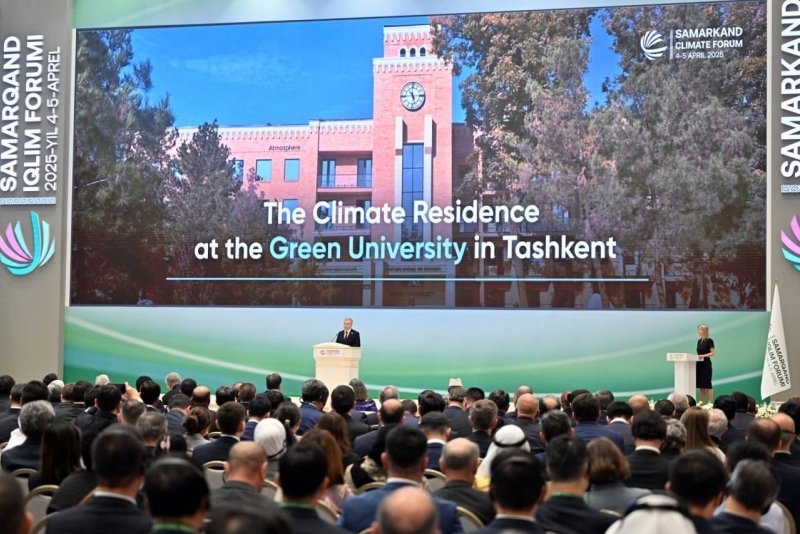
He suggested that the Climate Residency, established under the "Green University" in Tashkent, could serve as a regional hub for climate research and expert collaboration.
In a cultural initiative aimed at raising awareness of environmental issues through art, the *Aral Sea Culture Summit* will open on April 5 in Nukus.
In conclusion, President Mirziyoyev underscored the common responsibility to ensure that future generations live in a stable, secure, and prosperous world.
“To achieve this, we must strengthen dialogue and coordinate our actions as nations united by a shared noble mission,” he said.
Live
All